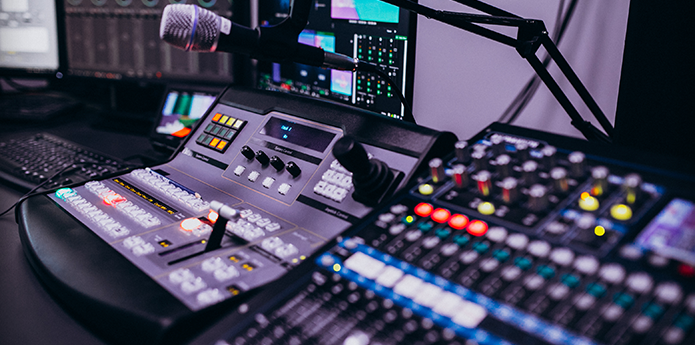You might feel overwhelmed when you enter the world of music production. You’re stepping into an industry that resonates with creativity, innovation and is constantly evolving. Talent is crucial, but a comprehensive understanding of technology, music theory, and industry trends is equally significant.

This article aims to guide aspiring music producers toward achieving their dreams. Whether it’s understanding the relevance of formal education, honing your technical skills, or building a solid network, each aspect plays an important role in your path to success. So let us look at how you can solidify your position in the music industry with these easy-to-grasp steps.
1. Pursue Formal Education
One might argue that formal education holds less significance than talent and passion in the realms of creativity. However, in music production, it’s a different ball game altogether. Getting formal music degrees can give you a solid foundation and an advantage in this competitive field.
A degree in music production or a related field offers organized learning experiences. It teaches you technical knowledge of audio equipment, software, and mixing techniques. It also gives you a deep understanding of music theory, sound design, and composition.
During your education, you’ll interact with industry professionals, learn from their experiences, and get insight into current trends. This exposure is often paired with hands-on projects, allowing you to use your learned skills practically. Music degrees also create opportunities for internships, which offer real-world experience and the chance to make industry connections.
2. Regularly Revisit Music Theory
Music theory might seem like a boring subject compared to the excitement of creating new beats or mixing tracks, but it’s an essential part of being a skilled music producer. Music theory is the grammar of the musical language, and understanding it allows you to communicate effectively and create music that connects with your audience.
Learning music theory gives you insight into how music works. It’s more than just reading sheet music; it includes understanding scales, chords, harmony, rhythm, and much more. This knowledge helps you write melodies, create harmonies, and understand how different musical elements work together. Constantly revising and expanding your knowledge of music theory is essential. The more you understand, the more tools you have when it’s time to create.
3. Build a Solid Network
Networking is essential in music production, just like in any other industry. The people you meet can help you access opportunities and partnerships you might not find otherwise. If you’re in a degree program, start by reaching out to other music production students. Go to music events, seminars, and workshops to interact with professionals in the field.
You can also use online platforms like LinkedIn and music production forums to grow your network. Remember, networking is about creating genuine relationships. Be polite and show real interest in other people’s work. These relationships can result in collaborations, job opportunities, and even guidance from experienced professionals.
4. Refine Your Technical Skills
Music production is a technical art combining the creative process with technology. Knowledge of software such as Pro Tools, Ableton Live, and Logic Pro X is crucial. These digital audio workstations (DAWs) are the industry standard music production, recording, and mixing tools. Get comfortable with them, and understand their features and capabilities.
Being a music producer also involves understanding recording and mixing techniques. It’s about more than just knowing which button to push; you need to understand how to create the right sound for each piece of music. You should know how to manipulate EQ, reverb, and compression to enhance or alter sounds.
It’s important to remember that while these tools and techniques are important, they’re also continually evolving. Staying updated with the latest technologies and software upgrades is a part of the job.
5. Understand the Business Aspect
While the creative side of music production often takes the spotlight, understanding the business aspect is just as important. As a music producer, you’re not only creating art, but you’re also selling a product. Having a grasp of the industry’s business side teaches you how to navigate contract negotiations, protect your work, and market your skills effectively.
Start by learning about copyright laws and how they protect your music. Understand how royalties work and how you can make money from your music through licensing and synchronization deals. Understanding these aspects will help you protect your rights and ensure you get paid for your work.
You should also understand how contracts work in the music industry. Whether you’re working with an artist, record label, or other professionals, contracts define the terms of your relationship. They explain your roles, responsibilities, and payment terms.
Don’t forget the importance of financial management. Make a budget for your projects, track your costs, and manage your income effectively. This business-smart mindset is a necessary complement to your creative skills and can greatly contribute to your success in the music industry.
6. Foster Your Unique Sound
One of the key factors that can set you apart as a music producer is having your distinctive sound. Your sound is like your signature, something that makes you recognizable among the many other producers in the industry.
However, developing this uniqueness is not an easy task. You should immerse yourself in different types of music and genres. Don’t limit yourself to what you’re comfortable with or usually listen to. By exploring various music, you can discover elements that resonate with you and incorporate them into your work. Experiment with different production techniques. Don’t be afraid to try something unconventional. Remember, many memorable music pieces break the mold and defy the norm.
7. Create a Portfolio
Your work is your voice in the world of music production. Putting together a collection that shows your talents as a music producer is important. It can be a mix of original songs, remixes, or projects done for clients. Your collection should show your flexibility and skill in working with different musical genres.
This portfolio allows potential clients or employers to see your abilities, creativity, and unique musical style. Make sure your portfolio is easy to find. You can make a website or use platforms like SoundCloud or YouTube to display your work. The quality and variety of your productions matter more than the number.
Conclusion
The path to becoming a successful music producer can be difficult, but the joy of creating music that touches people is incredibly fulfilling. So keep learning, keep creating, and use the information you have learned in this article to boost yourself to success.









